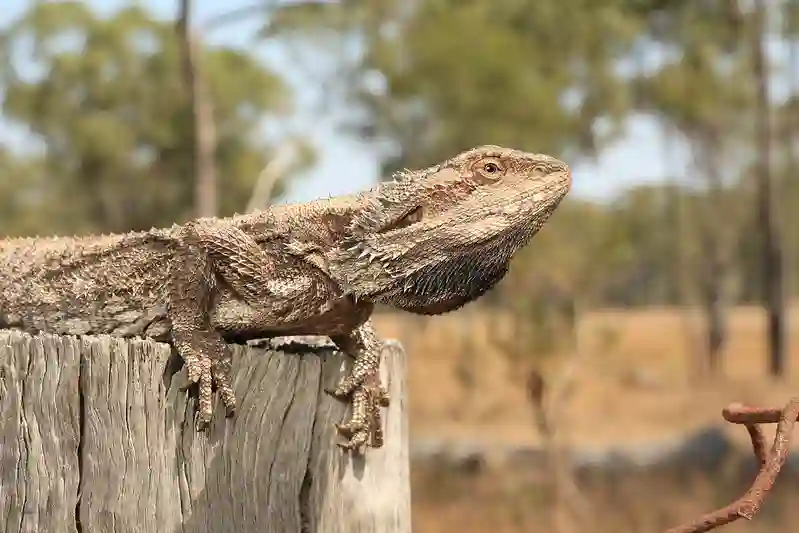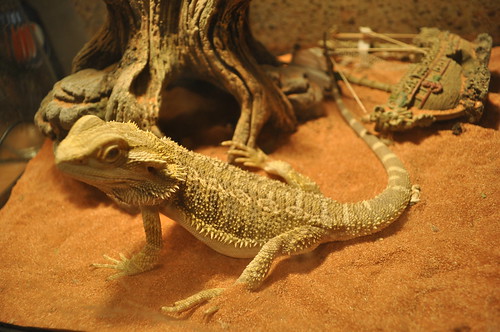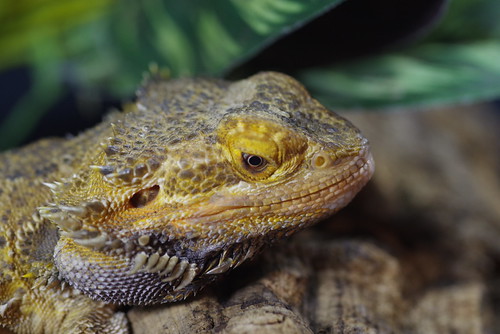To take care of a bearded dragon during brumation, follow these steps:
- Monitor their behavior and ensure they are parasite-free by taking them to a vet before brumation begins.
- Provide a hiding spot for your bearded dragon to rest during brumation.
- Ensure they have had a bowel movement before entering brumation to eliminate the risk of trapped food.
- Maintain their habitat, including lighting and heating at comfortable winter levels.
- Do not feed your bearded dragon during brumation, but provide a small water basin for them to drink when needed.
- Monitor their health and weight throughout brumation, checking on them every couple of days.
- Consult a vet if your dragon loses noticeable weight or develops smelly stools during brumation, as these may be signs of illness or parasites.
Remember to give your bearded dragon space during brumation and avoid handling them unless necessary.
What is Brumation in Bearded Dragons?
Brumation is a hibernation-like state that bearded dragons enter during the winter months. It is a natural process of slowing down their metabolism and conserving energy to survive colder temperatures and scarce food sources in the wild.
During brumation, bearded dragons can experience significant physical changes, including weight loss, decreased appetite, lethargy, and reduced activity levels. Though it may appear alarming to some pet owners, it is an essential period for the overall health and well-being of your bearded dragon.
Importance of Proper Care During Brumation
Proper care during brumation is critical for your pet’s survival and long-term health. Without adequate preparation or maintenance of their environment, bearded dragons can experience severe consequences such as dehydration, malnutrition, or even death. Therefore, it’s essential to take the required measures to ensure their safety and comfort during this period.
In addition to this basic care requirement being a necessity for the animal’s survival, proper care during brumation also affects how healthy your reptile will be after waking up from hibernation-like status.
The better they’re cared for – with appropriate hydration techniques and feeding schedules – while going through brumating status; the healthier they will most likely wake up from it with better health than those who receive minimum care requirements met by their human caretakers.
Preparing for Brumation
Signs that your bearded dragon is ready for brumation
Before starting the process of brumation, it is important to check if your bearded dragon is ready for it. The signs that show that a bearded dragon is ready for brumation are decreased appetite, lethargy, and behavioral changes such as staying in one spot all day or hiding more often than usual.
These signs indicate that the metabolic process of your pet has slowed down and they are preparing themselves for a period of dormancy. It is essential to keep an eye on these signs so you can prepare accordingly.
Setting up a suitable environment for brumation
It’s crucial to set up a suitable environment for your bearded dragon before starting brumation. This environment should mimic their natural habitat as closely as possible, which means providing proper lighting, temperature, humidity levels, and hiding spots.
Temperature and lighting requirements
During brumation, the temperature should be lowered gradually over a few weeks until reaching around 60 degrees Fahrenheit (15°C). The lighting should also be reduced to 8-10 hours per day with no UVB light provided. These changes will help trigger the slowing of metabolism in your bearded dragon.
Humidity levels
Maintaining proper humidity levels during brumation can help prevent dehydration and skin problems. A relative humidity level between 40-50% should suffice during this time.
Hiding spots and bedding materials
Providing hiding spots such as caves or boxes filled with bedding material like shredded paper or coconut fiber will give your pet a sense of security during the dormant period. Additionally, using sand or soil as substrates may cause impaction in some cases; therefore avoiding them would be a better option.
Bedding materials like paper towels or carpet can be used instead as they are safe and easy to clean. Proper preparation before brumation is critical for the health of your bearded dragon.
You need to observe their behavior and set up an appropriate environment that includes the right temperature, lighting, humidity levels, and hiding spots with suitable bedding material.
Feeding During Brumation
While bearded dragons are in brumation, they will eat much less frequently or even stop eating altogether. This reduction in food intake is a natural process and is nothing to worry about. However, it’s important to be aware of how to adjust their feeding schedule and what types of food to offer during this time.
Adjusting feeding schedule before brumation
To prepare your bearded dragon for brumation, you should gradually reduce the amount of food you give them over a period of several weeks. It’s important not to stop feeding them suddenly as this could cause them stress or other health problems.
Instead, aim to reduce their daily intake by 10-20% each week until they eventually stop eating completely.
You should also monitor your bearded dragon’s weight during this time and make sure they are at a healthy weight before entering brumation. Any signs of significant weight loss could indicate that your dragon is not ready for brumation yet, or that there may be underlying health issues that need to be addressed.
Types of food to offer during brumation
During brumation, it’s important not to offer too much protein as this can cause digestive issues or even death in extreme cases. Instead, focus on providing your bearded dragon with vegetables and fruits that are high in water content and fiber such as leafy greens (kale, collard greens), squash (butternut squash), or berries (blackberries).
Watermelon flesh also represents an excellent hydration source which would help the beardie stay hydrated throughout the winter months.
You can also provide small amounts of protein sources such as insects (crickets) every few weeks but make sure not to overdo it. Remember that the goal during brumation is to allow your bearded dragon’s body to rest and conserve energy, so overfeeding protein could defeat this purpose.
Hydration During Brumation
Importance of Hydration During Brumation
Proper hydration is essential to keep your bearded dragon healthy, even during brumation. Although they may not drink water as often as they do during their active season, they still need to stay hydrated. Bearded dragons can easily become dehydrated if they do not have access to water or a way to absorb moisture.
Dehydration can lead to serious health problems like kidney damage and digestive issues. During brumation, bearded dragons will often reduce their water intake and may even go several days without drinking.
However, it is crucial that you provide them with fresh water at all times so that they can drink when necessary. You should also monitor your dragon’s behavior closely for signs of dehydration such as lethargy, sunken eyes, or skin that remains tented after being pulled up slightly.
Methods to Ensure Hydration
There are several methods you can use to ensure your bearded dragon stays hydrated during brumation. One common method is providing a water bowl in their enclosure where they can drink whenever they feel thirsty. The bowl should be shallow enough for the dragon to easily reach and clean enough for fresh water every day.
Another option is misting the enclosure with a fine spray of water once or twice daily. This will create humidity in the air which will help keep your dragon’s skin moisturized and make it easier for them to absorb moisture through their skin.
Additionally, some owners choose to offer wet foods like fruits or vegetables during brumation which will provide additional hydration for their bearded dragons while also providing necessary nutrients. However, it is important not to overfeed or offer too much food since digestion slows down during brumation and excessive food can lead to health problems.
Monitoring Your Bearded Dragon During Brumation
Regular checkups on your bearded dragon’s health.
It is important to monitor your bearded dragon’s health regularly during brumation. You should observe your pet’s behavior on a daily basis to ensure they are healthy and not experiencing any issues. Some signs of good health in a bearded dragon can include active behavior, alertness, clear eyes, strong grip, and regular bowel movements.
A vet visit before and after brumation can also help ensure they are healthy. During brumation, your pet will become less active and may not eat or drink as often as they would during other times of the year.
This is normal but it’s still important to keep an eye out for any signs that could indicate a problem like weight loss or breathing difficulties. You should also check their body temperature regularly by taking their temperature with a thermometer.
Signs of stress or illness.
Bearded dragons can experience stress and illness during brumation just like any other time of the year. Stress can occur due to factors such as unsuitable temperatures, humidity levels, or lighting conditions in their enclosure or being handled too much while in brumation mode.
Signs of illness in bearded dragons can include lethargy, lack of appetite, diarrhea or constipation, respiratory problems like wheezing or coughing, and abnormal shedding skin among others.
If you notice any changes in their behavior that indicate physical issues such as unhealthy-looking skin condition it is always best to consult with a veterinarian who specializes in reptiles as soon as possible – this will help prevent serious complications from developing into life-threatening issues later on down the line!
Caring for Your Bearded Dragon After Brumation
Proper Rehydration Techniques
One of the most important things to do after your bearded dragon comes out of brumation is to rehydrate them. During brumation, they will not drink or eat as often, leading to dehydration. It’s important to offer water and ensure that your bearded dragon is drinking enough.
Offer fresh water daily in a shallow dish and mist their enclosure with water regularly. You can also give them a bath in lukewarm water for about 10-15 minutes every other day.
This will help them absorb water through their skin and rehydrate quickly. You can even add some electrolyte solution to the bathwater, which will help replace lost electrolytes during brumation.
Slowly Reintroducing Food
It’s crucial that you don’t feed your bearded dragon too much or too fast once they come out of brumation. Their digestive system has slowed down during brumation, and feeding too much too soon can lead to impaction or other digestive issues.
Start by offering small amounts of food, such as vegetables or insects, every other day for the first week after they come out of brumation. Gradually increase the amount and frequency of food over time until they are back on their regular feeding schedule.
Conclusion
Taking care of your bearded dragon during and after brumation requires patience, attention to detail, and understanding of their unique needs during this time. Proper hydration techniques are essential for ensuring they stay healthy throughout the process while reintroducing food slowly helps prevent any digestive problems.
By following the tips mentioned in this article, you’ll be well-equipped to handle your bearded dragon’s brumation and help them emerge from it in good health.
Remember, always monitor your bearded dragon for any signs of stress, illness, or impaction, and seek veterinary care if necessary. With the right care, your bearded dragon will make a full recovery and return to their usual lively self in no time.



